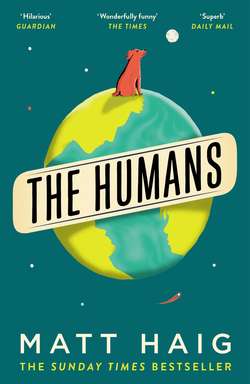Читать книгу The Humans - Matt Haig - Страница 10
На сайте Литреса книга снята с продажи.
The man I was not
ОглавлениеSo, what is this?
You ready?
Okay. Inhale. I will tell you.
This book, this actual book, is set right here, on Earth. It is about the meaning of life and nothing at all. It is about what it takes to kill somebody, and save them. It is about love and dead poets and wholenut peanut butter. It’s about matter and antimatter, everything and nothing, hope and hate. It’s about a forty-one-year-old female historian called Isobel and her fifteen-year-old son called Gulliver and the cleverest mathematician in the world. It is, in short, about how to become a human.
But let me state the obvious. I was not one. That first night, in the cold and the dark and the wind, I was nowhere near. Before I read Cosmopolitan, in the garage, I had never even seen this written language. I realise that this could be your first time too. To give you an idea of the way people here consume stories, I have put this book together as a human would. The words I use are human words, typed in a human font, laid out consecutively in the human style. With your almost instantaneous ability to translate even the most exotic and primitive linguistic forms, I trust comprehension should not be a problem.
Now, to reiterate, I was not Professor Andrew Martin. I was like you.
Professor Andrew Martin was merely a role. A disguise. Someone I needed to be in order to complete a task. A task that had begun with his abduction, and death. (I am conscious this is setting a grim tone, so I will resolve not to mention death again for at least the rest of this page.)
The point is that I was not a forty-three-year-old mathematician – husband, father – who taught at Cambridge University and who had devoted the last eight years of his life to solving a mathematical problem that had so far proved unsolvable.
Prior to arriving on Earth I did not have mid-brown hair that fell in a natural side-parting. Equally, I did not have an opinion on The Planets by Holtz or Talking Heads’ second album, as I did not agree with the concept of music. Or I shouldn’t have, anyway. And how could I believe that Australian wine was automatically inferior to wine sourced from other regions on the planet when I had never drunk anything but liquid nitrogen?
Belonging as I did to a post-marital species, it goes without saying that I hadn’t been a neglectful husband with an eye for one of my students any more than I had been a man who walked his English Springer Spaniel – a category of hairy domestic deity otherwise known as a ‘dog’ – as an excuse to leave the house. Nor had I written books on mathematics, or insisted that my publishers use an author photograph that was now nearing its fifteenth anniversary.
No, I wasn’t that man.
I had no feeling for that man whatsoever. And yet he had been real, as real as you and I, a real mammalian life form, a diploid, eukaryotic primate who, five minutes before midnight, had been sitting at his desk, staring at his computer screen and drinking black coffee (don’t worry, I shall explain coffee and my misadventures with it a little later). A life form who may or may not have jumped out of his chair as the breakthrough came, as his mind arrived at a place no human mind had ever reached before, the very edge of knowledge.
And at some point shortly after his breakthrough he had been taken by the hosts. My employers. I had even met him, for the very briefest of moments. Enough for the – wholly incomplete – reading to be made. It was complete physically, just not mentally. You see, you can clone human brains but not what is stored inside them, not much of it anyway, so I had to learn a lot of things for myself. I was a forty-three-year-old newborn on planet Earth. It would become annoying to me, later on, that I had never met him properly, as meeting him properly would have been extremely useful. He could have told me about Maggie, for one thing. (Oh, how I wish he had told me about Maggie!)
However, any knowledge I gained was not going to alter the simple fact that I had to halt progress. That is what I was there for. To destroy evidence of the breakthrough Professor Andrew Martin had made. Evidence that lived not only in computers but in living human beings.
Now, where should we start?
I suppose there is only one place. We should start with when I was hit by the car.
